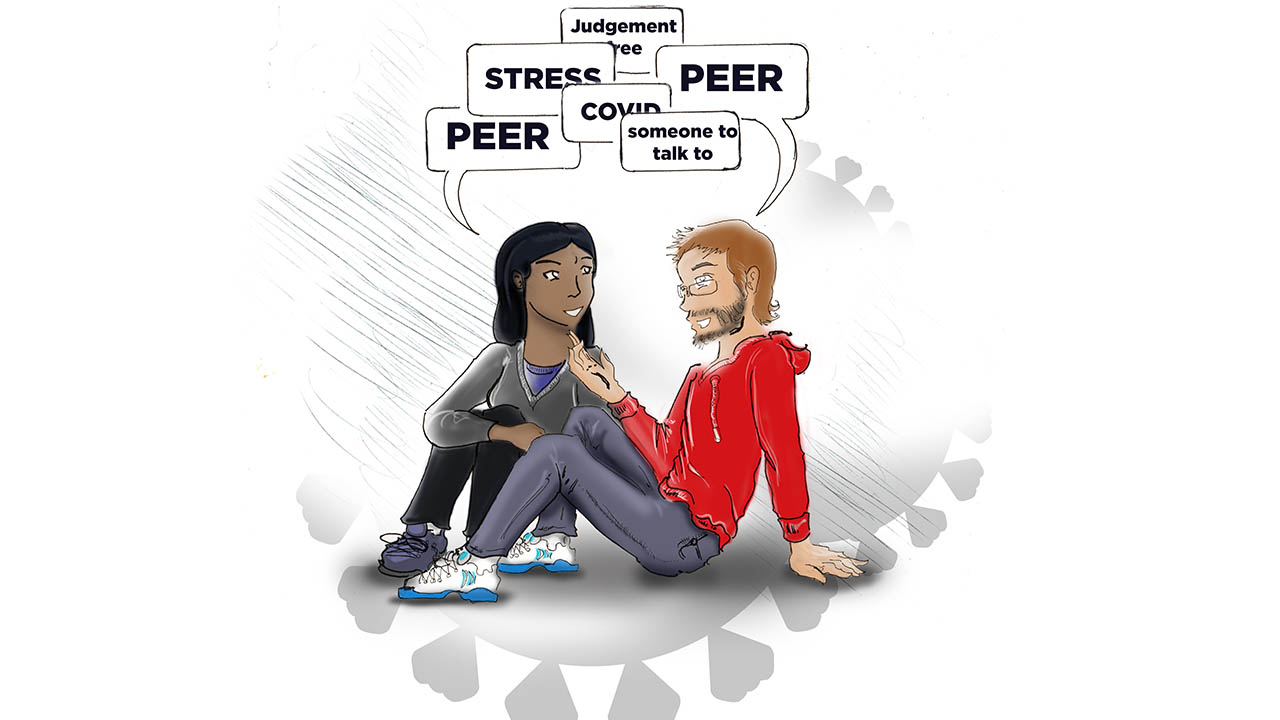It's okay to reach out for the ear of a peer
 CREDIT: CHRIS MISZCZAK
CREDIT: CHRIS MISZCZAKYour peers understand what you're going through better than anybody.
The pandemic is causing so much stress for so many individuals. The environment we are in is unique, plaguing us with our own set of struggles.
“We are all struggling with a sense of loneliness and peer support is a great opportunity to connect, to create a sense of belonging with other peers who simply get it. We do not have the same wellness strategies or self-care resources that we once had pre-pandemic. Peer support is trying to meet some of those unique needs of the students,” said Ashley Cochrane, Fanshawe’s case management counsellor and peer support lead.
The peer support program at Fanshawe College has been operating since 2018. Initially it was in partnership with the Canadian Mental Health Association (CMHA) crisis services. Since then, it has grown and evolved in terms of offering a variety of different services. Since September, the peer support program has been offering services virtually only. Adapting the program entirely and offering virtual drop in spaces for students.
The student peer support volunteers are trained in active listening, communication skills, anti-oppressive practice, diversity issues, oppression, accessibility concerns, supporting students in distress, and specifically how to respond to them by navigating and sharing that information, as well as resources with students on or off campus. Many have also been provided with Mental Health First Aid training as well.
Even after graduation, these peers use those skills to further their careers and improve their own interpersonal lives. They become ambassadors of human connection. There is going to be this ripple effect in our communities because of their beliefs and values and in how they care and love people.
“If you are a student at Fanshawe, there are so many services in place for you. There are so many people there for you. No matter what you have going on if you think you are struggling with something, there are people that you can talk to, to use as a sounding board if you are not sure,” said Lindsay Jackson, a student peer support volunteer who spoke to help advocate the peer services at Fanshawe College.
Rae Manjira, another student peer support volunteer added, “It’s good to have a judgement free place, where you can be yourself. It is so nice to be able to connect with another student, whom maybe has experienced similar things. It is nice to have that kind of connection.”
“Since we are all at home – social distancing, no one knows how to deal with that emotionally or mentally. For a peer-to-peer mentality, it is very good to talk to other students who are also going through that right now too. This is because online school, as convenient as it is with not having to travel. Simply tripled the amount of work and made all of it not worth a lot. It all equals 100 but there are 200 things to do. There is just so much to do,” said Cam Gillis, another student peer support volunteer. “I think that the ability to participate in peer support is simply more of a stress reliever. It is incredibly brave to be able to reach out. One does not have to be experiencing a midlife crisis to reach out. Peer support has been here the whole time, we would love to talk to anybody.” There is some comfort in knowing that what you are feeling that others are feeling it too, this normalizes it. You do not feel like you are going crazy, but that everyone else is feeling just as overwhelmed. It is okay to feel how you are feeling.
Something that peer support is trying this year is to have a social media presence to pull students in. In offering peer support in new and innovative ways. By offering peer support infographics about self-care, or an inspirational video. This too is a form of peer support because it will provide support to those who do not want to reach out to us individually. The goal is to reach people emotionally through social media and through technology.
Cochrane explained that the best way to connect with our peers is to email at peersupport@fanshawec.ca. From there you will be asked to provide some contact information and be provided with a zoom link. Drop in spaces are on Tuesdays, Wednesdays, or Thursdays from 2 p.m. to 4 p.m. You can attend as many sessions as you want, for as little or as long as you want. Students typically stay for about five minutes or up to 20 minutes. It all depends on what you are comfortable with.















